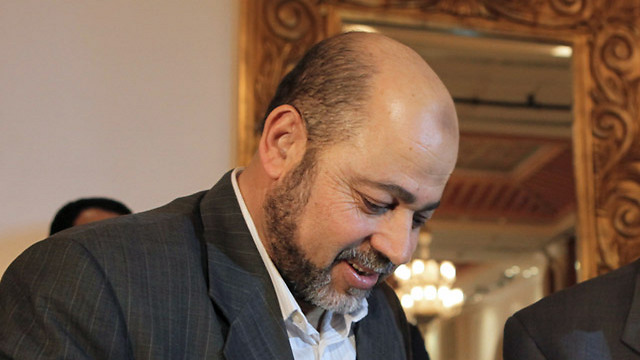Last June a dramatically important meeting was held in Lebanon concerning the shaken relationship between Hamas and some of the Arab and Muslim world. Group senior Moussa Abu Marzouk conferred there with officials from Iran and from Hezbollah to work out differences that have occurred between Hamas and then in the past two years over the Syrian civil war.
Related stories:
- Where will Hamas leadership go?
- Islamist movement Hamas moving closer to Iran
- Report: Iran increases support for Hamas
Iranian financial aid to Hamas seems to have renewed after the meeting, making it a pivotal turning point in Hamas' attitude towards the Arab Spring, and to the civil war and Syria specifically.
Since war broke out in Syria over two years ago, Hamas leadership chose to stand by the rebels and against Bashar Assad's regime; subtle at first, Hamas later publicly protested the massacre the Syrian president had committed against his country's civilians.
Meanwhile, Hamas leader left Damascus and spread out in different Arab countries, including Qatar and Egypt, and it was often reported the Palestinian group is taking an active part fighting with the rebels and against Assad.
Hamas turning its back on Syria – and by proxy on Iran and Hezbollah – didn't come without consequences. In Tehran and Dahiya, connections with the group were severed and financial and arms support were ceased.
Since then, Hamas leadership realized, it seems, it put its money on the wrong horse. Expectations for the Assad regime collapsing didn't come through and it seemed he was handling fights against the rebels. Options of a Western military intervention in Syria went on, and then off, the table. The Muslim Brotherhood was banned in Egypt, and the Egyptian army crackdown on Jihadists significantly narrowed supply to tunnels. Hamas found itself weak and isolated in the local arena, and the first step for a change was in the Lebanon meeting.
Last week a conference was held in Beirut concerning Jerusalem. Khaled Mashal spoke and said that the Arab nations have a right to fight for their independence, but it must be a fight far from bloodshed and tribal conflicts. He didn't name Syria, but was clearly referring to it; Syrian rebels reacted angrily, claiming he was trading Palestinian blood in exchange for monetary support form Iran.
Last week it was reported that Mashal himself will visit Tehran soon. The last time he visited Iran was two years ago.
In his interview, Moussa Abu Marzouk said he didn't rule out the possibility of renewing ties with Damascus and stressed that Hamas had never intervened with other countries; and while that statement might not factually be true, it may well be the beginning of a new strategy.
- Receive Ynetnews updates
directly to your desktop
















